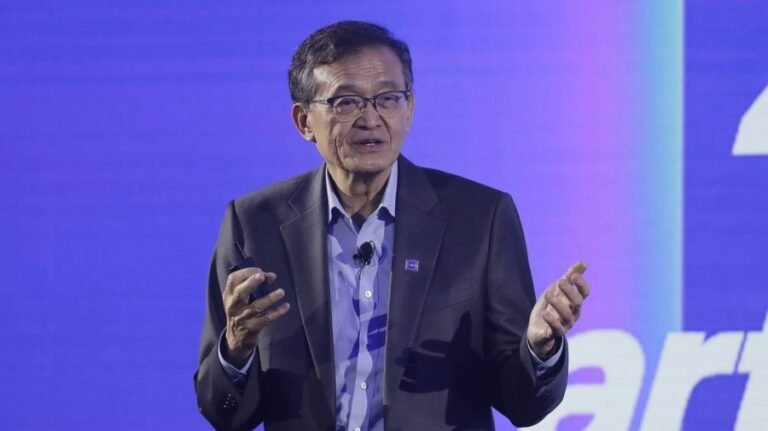
As the Trump administration settles in and federal budget priorities come under scrutiny, terminating foreign health funding may appear fiscally prudent to most conservatives. However, what many fail to recognize is that these investments serve dual purposes that directly benefit Americans: they improve global health and simultaneously safeguard our national interests.
Consider this paradox: cutting foreign health funding to “put America first” may actually put Americans at greater risk.
We’ve spent the past decade studying the intersection of public health and policy, with a focus on characterizing infectious disease surveillance in the Asia-Pacific region and developing behavioral and policy interventions for prevention and treatment. What we’ve observed is a complex web of interactions between the U.S. population and international communities that defies simplistic budget calculations.
The Philippines, where our (now terminated) National Institutes of Health-sponsored research was situated, offers an illuminating case study. With its strategic location and long history of U.S. military alliance, it regularly hosts thousands of American military personnel under the Visiting Forces Agreement. Alongside service members, large numbers of American tourists, business people, veterans, missionaries, students and immigrants/expatriates maintain continuous interactions with local communities, underscoring the ongoing exchange of people and public health risks.
What happens when these contacts occur in a setting with compromised public health infrastructure? A recent study reports that one-third of U.S. active-duty military personnel contract infectious diseases, with the greatest impact (64 percent) observed in service members during overseas deployments.
The dual threats of HIV and COVID-19 provide compelling examples.
In metropolitan Manila, HIV prevalence has risen at alarming rates over the past decade. According to the 2023 Philippine HIV/AIDS Registry, the total number of recorded HIV diagnoses surged by 31.54 percent between 2019 and 2022, increasing from 74,807 to 109,282 cases. During the same period, new diagnoses rose by 14.64 percent, with average daily HIV diagnoses between 35 to 44 cases.
Meanwhile, the Philippines reported approximately 4.2 million COVID-19 cases between 2020 and 2023, resulting in 65,000 deaths. Both HIV and COVID virus circulate in precisely the communities where Americans interact most frequently.
So why should American policymakers care? Because the consequences of these cuts extend far beyond the Philippines. The U.S. military continues to expand its base in the country to counter China’s growing influence, and U.S. soldiers and citizens frequently engage with local communities. In 2023 alone, the Philippine tourism sector welcomed 5.4 million international visitors, with nearly two in 10 coming from the United States.
Research confirms significant engagement between U.S. foreign visitors and local communities — many of whom face heightened risks of HIV and other infectious diseases such as tuberculosis.
This is where foreign health funding becomes crucial. The U.S. Departments of State and Defense and the U.S. Agency for International Development provided $169.5 million to the Philippines in 2023, which included military assistance, environmental management, programs aimed at economic development and human rights, among others, and with significant portions directed toward infectious disease prevention and surveillance.
These investments are not just about assisting local communities and keeping local communities from acquiring HIV and other infectious diseases — they also function as frontline defenses for Americans abroad, establishing early warning systems, improving treatment networks and mitigating the spread of infectious diseases before they reach U.S. borders.
This funding is now under severe threat. Cuts to global health investments have already begun to dismantle critical research and frontline services — not just in the Philippines, but worldwide. In addition to the global cuts in HIV research and the effective dismantlement of USAID, the President’s Emergency Plan for AIDS Relief, which has saved millions of lives over two decades, has faced mounting political unsupportiveness and faces reauthorization expiration, creating uncertainty about its future funding to combat HIV globally.
These cuts will reverberate through entire healthcare infrastructures, increasing HIV incidence rates, straining local health systems and ultimately leading to higher long-term costs for disease control.
Research shows that for every dollar cut on pandemic prevention measures, the cost incurred in responding to outbreaks that could have been prevented can be up to 500 times higher. For instance, investing $5 per person annually in pandemic preparedness (approximately $39 billion globally) is dwarfed by the $11 trillion spent on responding to COVID-19. Cuts to USAID funding could result in over 176,000 additional preventable deaths globally if foreign aid is not restored by the end of 2025, with concurrent increases in infectious disease transmission to U.S. citizens abroad.
As a nation, we spend billions on advanced weapons systems to protect national security, yet we hesitate to invest in the health of those who operate them and the public health measures that keep our military safe and healthy from the start. If we truly prioritize the wellbeing of American service members, we must recognize that health threats represent an Achilles’ heel to both military operations and broader national security.
Foreign health funding represents what security experts call “soft power” — influence exercised through assistance rather than coercion. U.S. investments in global health generate secondary benefits for the U.S., such as enhanced security, economic stability and reduced disease burden. For example, 11 of the top 15 U.S. trading partners are former recipients of U.S. foreign assistance programs, illustrating the long-term economic advantages of such investments.
As Congress deliberates budget priorities in the coming months, lawmakers should consider foreign health funding — not as charity but as a strategic investment in American security. Terminating health research and programs does not put America first, it puts Americans at risk.
Our health security and national security are inextricably linked in ways that transcend borders and budgets. In a world where the next pandemic is a matter of when, not if, we cannot afford to dismantle the early warning systems and response networks that protect Americans both at home and abroad.
Arjee Javellana Restar is a social and legal epidemiologist at Yale University, and a Robert Wood Johnson Foundation policy fellow. Don Operario is professor of social and behavioral sciences at Emory University.


